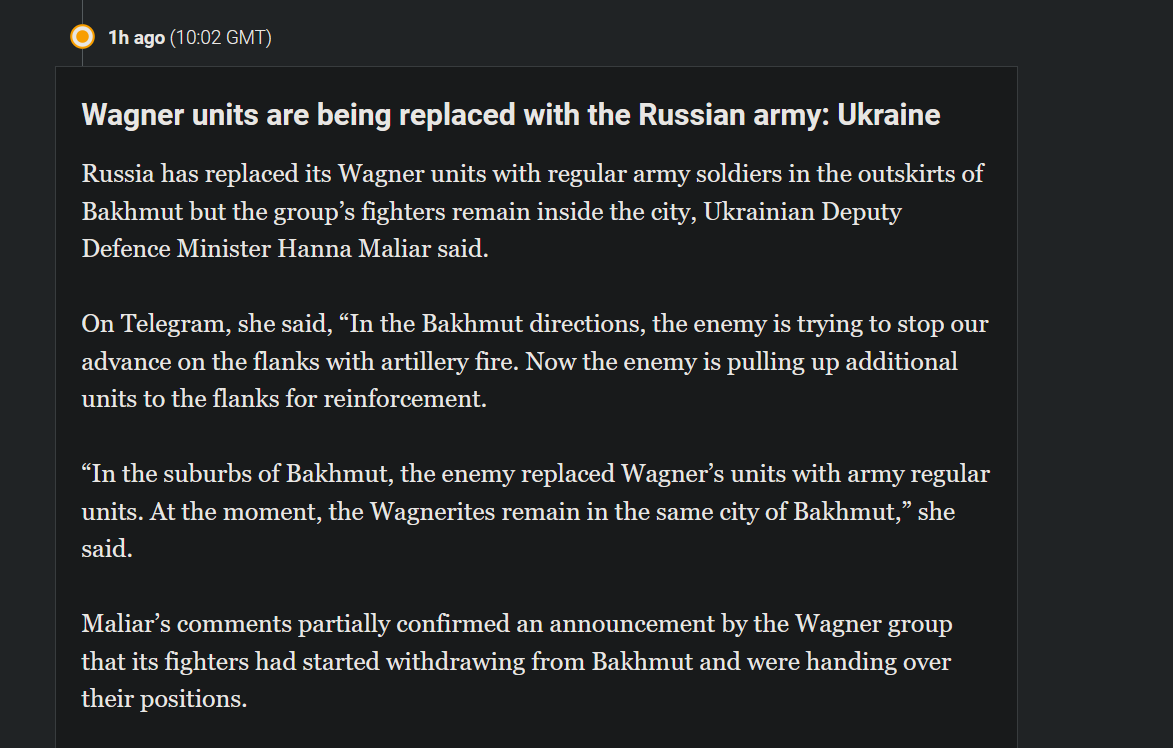
The market resolves Yes if Yevgeny Prigozhin, the Wagner Group boss confirms that they are withdrawing from Bakhmut and actually leave the city.
🏅 Top traders
| # | Trader | Total profit |
|---|---|---|
| 1 | Ṁ595 | |
| 2 | Ṁ475 | |
| 3 | Ṁ383 | |
| 4 | Ṁ266 | |
| 5 | Ṁ245 |
@ShadowyZephyr "British military intelligence said in its daily report on May 27 that Wagner fighters "have likely started to withdraw from some of their positions" in and around Bakhmut. "
If they likely started to withdraw from some positions there probably will be left Wagner units for a couple of days still, no?
@42irrationalist Yeah the "actually leaves the city" is in the description. if he's leaving troops behind or as it's reported in this article Russia's Wagner army starts handing Bakhmut over to regular troops | Reuters

that wagner's are still in the city, i think this has to be a no actually.
Edit: I think the phrase "actually leaves the city" makes it clear that they have to physically depart. Otherwise, it could have been understood that handing over their positions to the army was enough. Repositioning to another part still in the city is regrouping. I can't unsee the "actually leaves the city" part.
@johnleoks it would be great if you could provide clarity on how you'll determine the threshold for leaving?
I can see absolutist perspectives of '0' Wagner people allowed but it also seems, given that is a war, etc, that a reduction of like 90% would also count as 'leaving the city' since I suspect there's a ton of collaboration and mixed responsibles.
@42irrationalist This is fairly obvious is it not? If they are leaving forces in Bakhmut then they haven't left the city. How can anyone argue otherwise?
@johnleoks I think this is a sensible way to resolve the market, but I also don't think it's obvious. If they pull out 90% of forces and 10% are still there in a transitionary role, some people might think of that as a withdrawal, some not. (And btw my position on this market would benefit from you resolving the way you said, but I just am pointing out that it's by no means obvious.)
Just to give a different example, if we look at a question like "Will the US withdraw from Iraq in 2021?" - there are still US forces there, even though they don't have an official combat mission, so is that a withdrawal or not? Kind of unclear.
In July 2021, President Joe Biden announced that he would end the U.S. combat mission in Iraq by the end of 2021, with remaining U.S. troops serving in an advisory and assistance role.[7] The U.S. combat mission formally concluded on 9 December 2021, with 2,500 U.S. troops remaining in the country.[1
https://en.wikipedia.org/wiki/Withdrawal_of_United_States_troops_from_Iraq_(2020%E2%80%932021)
@johnleoks
If they only left 5% of their forces then they have largely left the city, no? What if it's 1% or 0.1%? I'm not splitting hairs trying to argue some technicality, "some forces left" is a likely scenario now.
> How can anyone argue otherwise?
Prigozhin might. Watch the guy.
@jack If there was only one condition that they withdraw, then it would have been possible to have a more loose interpretation. However, the second condition of "actually leave the city" is clear and specific in what needs to be accomplished for the yes resolution.
There's still 6 days left. It could all change.
@higherLEVELING The condition is "[Wagner group] actually leave the city" and the problem is that the group isn't all in one place. Some of them may stay while some of them leave.
One reasonable interpretation is "All of Wagner group actually leave the city", but it's not explicitly stated and other interpretations are possible.
@jack I don't have time right now to look at things properly but another interpretation of "actually leave the city" is just that it's not enough for Prigozhin to say they're withdrawing, they also have to do it.
@jack But the Wagner group is in one place. The Wagner group is located in Bakhmut. They may be dispersed throughout the city, but they are present in the city. The question on June 1st is: do they remain in Bakhmut?
I think the default interpretation of "Wagner group actually leaves the city" as "the entire Wagner group departs from the city" and not as "a portion of Wagner group exits the city". I think if it was intended to be "some of", the default when referring to a group, is to assume it as meaning the whole group.
@higherLEVELING I don't agree that's the default interpretation - see my example above about US withdrawal from Iraq. The default interpretation there appears to be that the US did withdraw, even though some forces remained.
@NamesAreHard I agree it's about whether they actually leave. The tricky question is about whether a partial withdrawal counts
@jack I think the example you're giving is missing the other part to this though. If the only condition was that Wagner withdraws, then I think comparing the US withdrawal from Iraq, with troops being left behind counting as a withdrawal, could apply here, and would resolve no. but the second condition needs to be added. If you add that the US have to actually leave Iraq. I don't see how you could resolve that as no if there were troops still in iraq. It would have to resolve as yes
@jack My point is that under that interpretation, the "actually leave the city" part has been included only in order to clarify this and adds no further semantic information about whether a partial withdrawal counts (as opposed to @higherLEVELING's interpretation where the existence of that part is important). My default interpretation on the partial withdrawal question is that it should count if most of them leave and the line is drawn somewhere over 75% for what "most" would be.
@NamesAreHard might it not be the case that there is an epistemological element to this? If Wagner performs a total withdrawal, it's quite probable that on June 1 there will still be a few mercenaries there whose truck broke down, or who are still performing some sort of handover task, or who are just straggling because discipline is poor. That might cause this question to resolve NO according to a 'hardline' interpretation, but in reality it is incredibly unlikely that we would know they were there.
If we, outside of the situation, have knowledge that Wagner mercenaries are still in Bakhmut it seems to suggest that it's situationally or militarily relevant that they are still there, which in turn suggests a NO resolution on the grounds that an announced withdrawal didn't represent the facts on the ground.
Russia-Ukraine live: Wagner forces begin Bakhmut ‘evacuation’ | Russia-Ukraine war News | Al Jazeera

the Ukrainian Deputy Defence Minister Hanna Maliar saying that wagner units are getting replaced by army
@ShadowyZephyr I bet on this thinking that if they have substantially reduced their footprint or are substantially in the process of withdrawing their presence. I hope that's how it's interpreted.
The question is whether Wagner's troops will they pull out by the end of May. If they start the withdrawal process on May 25th to June 1st, does that count as leaving by the end of May? Or is that considered the beginning of June and the market resolves as no? Or does the market resolve as yes regardless of when they finish the withdrawal, as long as they start it on May 25th?
@higherLEVELING Sorry, I didn't see this comment, this is essentially what I was asking. Is it about averaging the start and end dates, the official end date, the date when most troops have left, or what?